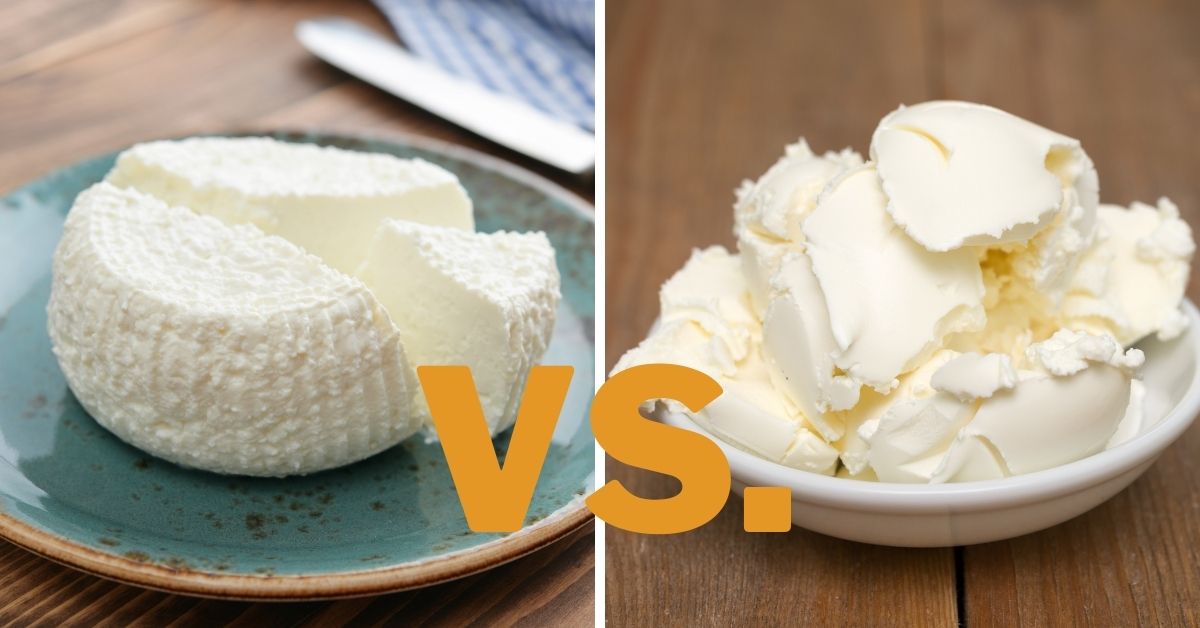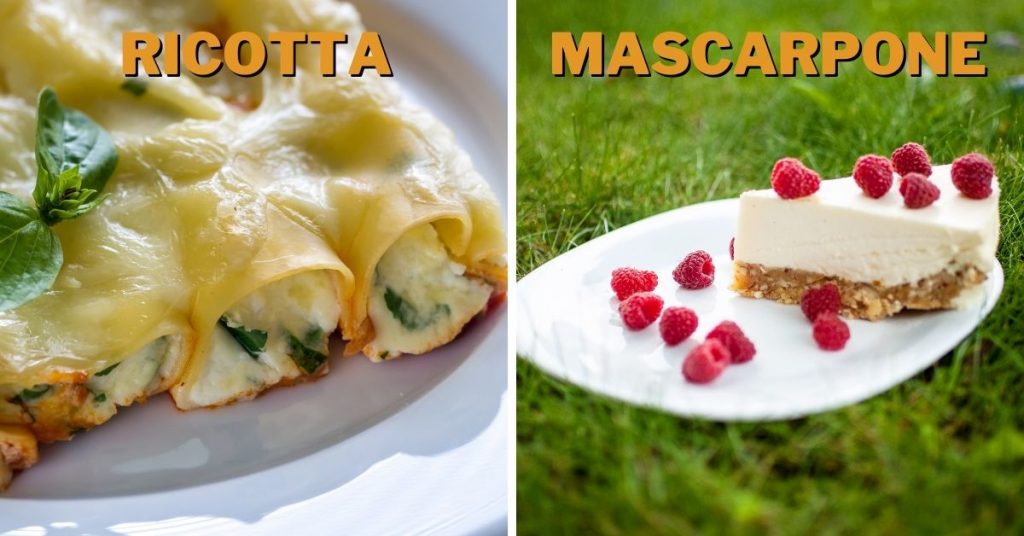Ricotta vs. Mascarpone: Differences & Which One to Use?

When discussing Italian cheese, two names will invariably come up – ricotta and mascarpone. Both of them are staples in Italian cuisine, used in all sorts of savory and sweet dishes. But how do they differ from each other? And which cheese is better: ricotta or mascarpone?
Mascarpone is a cream cheese made by adding acid to milk whereas ricotta is made from the leftover whey. Mascarpone has a creamy consistency and milky, sweet taste while ricotta has a grainy, fluffy texture that tastes tangier. Hence, mascarpone is better for desserts and ricotta for savory dishes.
We are going to take a closer look at both types of cheese and find out how they are made, how they differ in taste and texture, and how that affects a particular dish, as well as their nutritional value and impact on our diet.
Ricotta vs. Mascarpone: Differences
Ricotta and mascarpone offer different characteristics in a dish and behave differently with other ingredients. As such, it is important to know their specific properties before adding them to a dish.
Production
Cheese can have several distinct making processes. And ricotta and mascarpone have stark distinctions in how people make them. But almost all cheese starts with a dairy, typically cow’s milk, and both of these cheeses are no different.
Mascarpone is made by adding acid (tartaric acid or similar substance) to pasteurized cow’s milk. The acid coagulates the milk to form the curd or solids that are later packaged as cheese. This is noticeably different from making other cheeses such as mozzarella or parmesan. Because here, the acid acts as the coagulant instead of an enzyme.
Ricotta has a production process very unique from most other types of cheese you find on the market. Instead of the milk curd or solid, ricotta incorporates the whey, which is basically the liquid that remains after you separate the curd during the production of other varieties of cheese.
Even after the curd has been separated, much of the milk protein still remains in the whey. This is why ricotta has a grainier texture than most cheese as it is low in fat. Luckily, there are ways to make it smooth.
Taste
Ricotta cheese has a mildly sweet and a bit acidic flavor profile. In contrast, mascarpone has a sweeter, milky flavor that is similar to mozzarella or burrata.
Texture
Ricotta, due to the nature of its making process, has a grainy but fluffy texture. In this way, it is very similar to cottage cheese. Ricotta’s light and fluffy nature make it ideal for things such as lasagna or pasta.
On the other hand, mascarpone is smoother and creamier. Its consistency is similar to cream cheese or Crème fraîche. This is mainly due to its high-fat content; not just in comparison to ricotta but to many other types of cheese.
Additionally, ricotta is a lot more watery than mascarpone. Once again, this is since ricotta is made from the liquid portion (whey) and mascarpone uses the solids (curd).
Use
Given its delightfully creamy and soft texture and sweet flavor profile, mascarpone is a prominent part of various desserts. foods such as tiramisu and cheesecake are the ideal situations to utilize the qualities of mascarpone.
Ricotta, in contrast, is much more suited for savory dishes. Grate ricotta over a pizza or lasagna and you will have a wonderfully light and cheesy experience. Ricotta is also easier to spread onto a dish. Thanks to its grainy texture, ricotta is easier to grate on top of food.
This does not mean that ricotta does not see use in desserts nor that mascarpone cannot be used in savory foods. It is just that mascarpone’s use in sweet treats is more well known. And the same goes for ricotta.

Appearance
You can tell both types of cheese apart just by looking at them. Mascarpone has an ivory hue that is not completely white. In contrast, ricotta is milky white, with a fluffy exterior.
Also, thanks to its consistency, mascarpone looks almost identical to cream cheese. And when you pick it up with a spoon it will resemble more cream than cheese.
Nutrition & Calories
Picking the right cheese is not simply a matter of taste. You also need to consider the effect it will have on your diet. And ricotta has a different nutritional value compared to mascarpone. For this comparison, the sample size we are going to look at is 1 cup or about 250 grams.
The most obvious difference is their respective fat content. 1 cup of ricotta cheese contains roughly 20 grams of fat whereas the same amount of mascarpone can contain 150 grams of fat. [1] [2] In general, ricotta cheese has a fat percentage of 10 to 15% while mascarpone can have a fat content between 45-55% or even higher.
All of this fat accounts for mascarpone’s high level of calories. Depending on its specific source, mascarpone can have 2 to 3 times more calories per serving than ricotta cheese. This is something you definitely need to consider if you are someone looking to control daily calorie input.
Keeping in line with this trend, mascarpone will possess higher cholesterols and saturated fats in contrast to ricotta. In fact, mascarpone can have as much as 5 times more cholesterol than ricotta cheese.
The other noticeable difference in nutrition between our two candidates is their protein level. Ricotta is made from whey, which is primarily leftover milk protein. 1 cup of ricotta can give you 28 grams of protein. In contrast, mascarpone has 14-18 grams of protein per cup, which is less than half of what ricotta offers.
Ricotta also edges mascarpone in terms of carbohydrates. A cup of ricotta has 13 grams of carbs whereas mascarpone has around 7-8 grams. So, ricotta has 50% more carbohydrates per gram than mascarpone.
Since both of them are sourced from cow’s milk, they have a decent amount of calcium in them. Again, ricotta has noticeably more calcium than mascarpone.
In terms of vitamins, mascarpone has the advantage over ricotta in one key area. Mascarpone has a relatively high level of vitamin A, which is thanks to its greater fat content.
| Ricotta | Mascarpone |
|---|---|
| Slightly acidic and tangy flavor | Sweeter and creamier flavor |
| Fluffy and grainy consistency | Smooth and thicker consistency |
| Made from leftover whey | Made from the curds |
| High in protein | Low in protein |
| Low in calories | Very high calorie content |
| Low in fat and saturated fat | High in both cholesterol and saturated fat |
| Has more calcium | Has more vitamin A |
| Has a milky white appearance | Has an ivory white hue |
| Better for lasagna and pizzas | Better for cheesecake and tiramisu |
Which Is Better, Ricotta or Mascarpone?
In terms of usefulness in cooking, it really depends on the exact recipe you are making. If you are making tiramisu or a non-baked cheesecake, then mascarpone is the way to go. It will be like adding cream to your dish in the form of cheese.
But if you were making a pasta dish or stuffed pizza, ricotta is probably the better choice. Ricotta is easier to spread on top of these dishes and produces a lighter and less sweet product compared to mascarpone.
In terms of nutrition, however, ricotta cheese has a clear edge over mascarpone. Not only does ricotta possess less saturated fat and calories, but it also offers significantly more protein than mascarpone. Ricotta can also be a good source of calcium. [1]
While mascarpone has a relatively decent level of vitamin A, its overall nutritional value is inferior to ricotta. So, if you were looking for a healthier cheese option and you had to choose between these two, then ricotta would be the wiser selection.
Ricotta or Mascarpone for Cannoli?
Traditionally, cannoli pastry consists of a sweet filling that contains ricotta. But if you want a creamier and smoother texture in the filling, then you can use mascarpone. Ricotta, however, is the cheese of choice when it comes to making cannoli.
Ricotta or Mascarpone for Pasta?
Ricotta, thanks to its fluffier and spreadable nature, is often preferred for pasta, especially lasagna dishes. You can use mascarpone on pasta if you were seeking a sweeter taste and creamier consistency.
Ricotta or Mascarpone for Tiramisu?
Typically, tiramisu utilizes mascarpone cheese as it is very smooth and creamy. This goes well with tiramisu as the cheese basically functions as heavy cream. ricotta has a higher water content, which may hamper the structure of the tiramisu should you choose to use it.
Ricotta or Mascarpone for Cheesecake?
Similar to tiramisu, cheesecake is another dish that is fantastic for using mascarpone. You can even use it for non-baked cheesecakes. However, if you were making baked cheesecakes, then you can use ricotta as well. Just make sure to use ricotta that has very fine curds as that will give the cake a smoother texture.
Ricotta or Mascarpone for Pizza?
Ricotta is an ideal cheese for any pizza as the spreadable nature and texture will give you a rich and savory flavor. Mascarpone can be used on top of the cheese if it is accompanied by a tangy and acidic element.
Ricotta or Mascarpone for Lasagna?
Ricotta goes very well with lasagna as it melts well in the oven. However, you can choose to use mascarpone for a creamier texture.
Ricotta or Mascarpone for Sauce?
Typically, ricotta is the cheese of choice for making pasta sauces and other meat-based sauces, because the taste of ricotta complements the more savory flavor of meat and tomatoes.
Ricotta or Mascarpone for Sernik?
Sernik is a Polish cheesecake that utilizes curd cheese instead of cream cheese. This grounded curd cheese is much more similar to ricotta in terms of texture than mascarpone. So, highly curdled ricotta is the better choice for sernik.
Ricotta or Mascarpone for Dip?
If you want to make a dip for nachos or chicken fries, then ricotta is probably the way to go. Ricotta cheese has a lot more moisture and therefore, works better as a dip than mascarpone. Mascarpone can clump together like thick cream so they are harder to dip your fries in.
Can You Use Ricotta Instead of Sour Cream?
You can use ricotta instead of sour cream in a pinch. The biggest obstacle here is the texture. Sour cream is smooth and thick while ricotta is grainy and fluffy. So, if you do want to substitute sour cream, mix 1 cup of cheese with ¼ cup of milk to better replicate the taste and texture.
Alternatively, you can use sour cream in a recipe that calls for ricotta cheese but only if the ricotta is not a prominent part of the dish. You can use sour cream as a dip instead of ricotta. But if you want to substitute ricotta in a lasagna or pasta dish, it is better to use cottage or goat cheese.
In conclusion, ricotta and mascarpone are great ingredients to have for any chef to have, professional or amateur, for varying reasons. And knowing how their differences and similarities can help you select the right cheese for your next dish.
